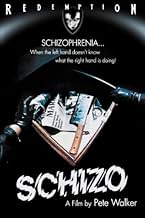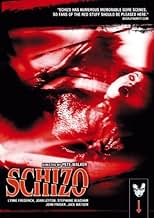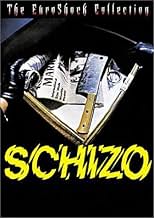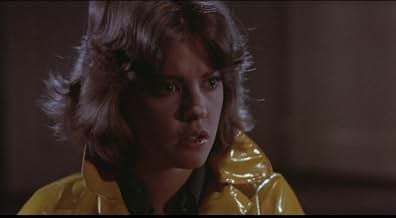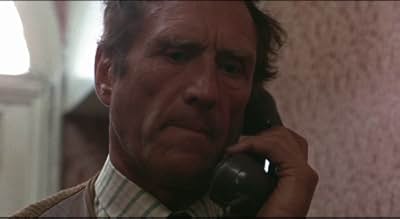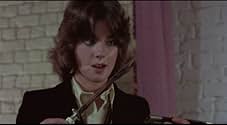AVALIAÇÃO DA IMDb
5,7/10
1,5 mil
SUA AVALIAÇÃO
Adicionar um enredo no seu idiomaA newly-married woman becomes convinced someone from her past is stalking her, but nobody believes her until the bodies start to pile up.A newly-married woman becomes convinced someone from her past is stalking her, but nobody believes her until the bodies start to pile up.A newly-married woman becomes convinced someone from her past is stalking her, but nobody believes her until the bodies start to pile up.
- Direção
- Roteiristas
- Elenco e equipe completos
- Produção, bilheteria e muito mais no IMDbPro
Enredo
Você sabia?
- CuriosidadesLynne Frederick supplied some of her own wardrobe for this film due to its very low budget.
- Erros de gravaçãoIn the introductory voice over, schizophrenia is likened to multiple personality disorder (or dissociative identity disorder). In reality, these are two entirely different ailments, one being a disruption in a person's perception of reality (schizophrenia) and the other a disconnect between more than one personality state (DID).
- Versões alternativasThe original UK cinema version was cut by the BBFC to edit the stabbing of a naked woman during the flashback scene. However additional cuts were made (totalling 1 min 3 secs) for the video release with further edits to the same scene plus cuts to the hammer murder, a sex scene and the stabbing of Mrs Wallace through the head with a knitting needle. The 2008 Redemption DVD is fully uncut.
- ConexõesFeatured in My Sweet Schizo (2012)
Avaliação em destaque
SCHIZO
Aspect ratio: 1.85:1
Sound format: Mono
A young figure skater (Lynne Frederick) is stalked by a convicted killer (Jack Watson), recently paroled from prison, whose appearance coincides with a series of vicious murders.
Typical entry from British sleaze specialist Pete Walker (FRIGHTMARE), taking its cue from the giallo shockers popular throughout continental Europe at the time. Less confrontational than some of Walker's previous outings ("It was less Gothique... I wanted less incident and outrage," he explained to journalist Alan Jones in 1983), SCHIZO still delivers the gory goods, though it takes rather too long to work up a decent head of steam. Climactic dividends are reaped by a steady accumulation of narrative details, but individual scenes are somewhat labored, not helped by Frederick's lack of presence in the leading role. By contrast, Stephanie Beacham (DRACULA A.D. 1972) is utterly charming as a family friend who turns detective when Frederick identifies Watson as her stalker - had the roles been reversed, this could have been a small masterpiece of psychological horror. Other stand-outs include veteran character actor Watson (recognizable from brief appearances in countless British movies, here given a much weightier role than usual), and a bearded John Fraser ("The Trials of Oscar Wilde") as a psychiatrist who pays the price for digging too deeply into the circumstances surrounding the death of Frederick's mother.
Aware of his own directorial limitations, Walker always allowed clever scriptwork to dictate his method, but he was no hack, as SCHIZO ably demonstrates. Here, his point-and-shoot style is punctuated by moments of genuine visual dexterity, such as the circling of a pen on a newspaper article which gives way (via dissolve) to a spinning ice-skater, or the truly unsettling séance during which medium Trisha Mortimer manifests physical signs of possession by one of the killer's former victims. The subsequent murders are blunt and bloody, with no pretence to subtlety. Peter Jessop's artful cinematography and Chris Burke's sensitive art direction make a virtue of the film's seedy locations, and while a good fifteen minutes could have been cut from the overlong narrative (most of the film's highlights are confined to the second half), editor Alan Brett manages to streamline an increasingly complicated scenario with some degree of panache.
Screenwriter David McGillivray parted company with Walker after this one, due partly to the quality of the script (based on an old work by Murray Smith, author of Walker's earlier films), which McGillivray felt was too transparent, and rendered the killer's identity obvious from the outset. Maybe so, but some of the climactic revelations still pack a hell of a punch. Bottom line: If you're a fan of Walker's output or British exploitation in general, you'll overlook the film's slow-burning tempo and enjoy its outlandish plot developments. Worth a look.
Aspect ratio: 1.85:1
Sound format: Mono
A young figure skater (Lynne Frederick) is stalked by a convicted killer (Jack Watson), recently paroled from prison, whose appearance coincides with a series of vicious murders.
Typical entry from British sleaze specialist Pete Walker (FRIGHTMARE), taking its cue from the giallo shockers popular throughout continental Europe at the time. Less confrontational than some of Walker's previous outings ("It was less Gothique... I wanted less incident and outrage," he explained to journalist Alan Jones in 1983), SCHIZO still delivers the gory goods, though it takes rather too long to work up a decent head of steam. Climactic dividends are reaped by a steady accumulation of narrative details, but individual scenes are somewhat labored, not helped by Frederick's lack of presence in the leading role. By contrast, Stephanie Beacham (DRACULA A.D. 1972) is utterly charming as a family friend who turns detective when Frederick identifies Watson as her stalker - had the roles been reversed, this could have been a small masterpiece of psychological horror. Other stand-outs include veteran character actor Watson (recognizable from brief appearances in countless British movies, here given a much weightier role than usual), and a bearded John Fraser ("The Trials of Oscar Wilde") as a psychiatrist who pays the price for digging too deeply into the circumstances surrounding the death of Frederick's mother.
Aware of his own directorial limitations, Walker always allowed clever scriptwork to dictate his method, but he was no hack, as SCHIZO ably demonstrates. Here, his point-and-shoot style is punctuated by moments of genuine visual dexterity, such as the circling of a pen on a newspaper article which gives way (via dissolve) to a spinning ice-skater, or the truly unsettling séance during which medium Trisha Mortimer manifests physical signs of possession by one of the killer's former victims. The subsequent murders are blunt and bloody, with no pretence to subtlety. Peter Jessop's artful cinematography and Chris Burke's sensitive art direction make a virtue of the film's seedy locations, and while a good fifteen minutes could have been cut from the overlong narrative (most of the film's highlights are confined to the second half), editor Alan Brett manages to streamline an increasingly complicated scenario with some degree of panache.
Screenwriter David McGillivray parted company with Walker after this one, due partly to the quality of the script (based on an old work by Murray Smith, author of Walker's earlier films), which McGillivray felt was too transparent, and rendered the killer's identity obvious from the outset. Maybe so, but some of the climactic revelations still pack a hell of a punch. Bottom line: If you're a fan of Walker's output or British exploitation in general, you'll overlook the film's slow-burning tempo and enjoy its outlandish plot developments. Worth a look.
- Libretio
- 13 de mar. de 2005
- Link permanente
Principais escolhas
Faça login para avaliar e ver a lista de recomendações personalizadas
- How long is Schizo?Fornecido pela Alexa
Detalhes
Contribua para esta página
Sugerir uma alteração ou adicionar conteúdo ausente

Principal brecha
By what name was Demência Sinistra (1976) officially released in Canada in English?
Responda

